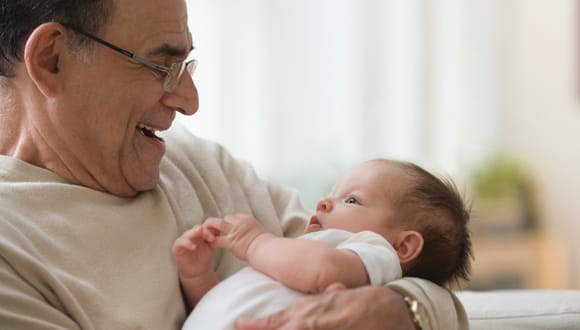What to Know About the RSV Vaccine for Older Adults & Infants
Sep. 11, 2023 - Katie McCallumFlu and COVID-19 are the respiratory viruses we hear about the most, but if you're 60 or older or a new or expecting parent, you should also be aware of another highly contagious bug that circulates in the fall and winter: respiratory syncytial virus (RSV).
"In adults, RSV can cause one of those colds that lasts for weeks and is unpleasant," says Dr. Wesley Long, medical director of diagnostic microbiology at Houston Methodist. "But in babies and older adults, it can cause even more severe illness, sometimes life-threatening."
The good news is that this respiratory season, there are new tools to protect these more vulnerable individuals: two vaccines and a preventive therapy.
"Older adults will now have access to RSV vaccines," says Dr. Long. "And a new immunization of monoclonal antibodies is available to help protect infants from RSV during their first respiratory virus season — and for certain children during their second respiratory season, too."
Here's what older adults, caretakers and new or expecting parents need to know about the new RSV shots:
What is the RSV vaccine?
Two RSV vaccines, Arexvy and Abrysvo, were approved for use in older adults this past summer. Both work by stimulating a protective immune response against RSV, and both were shown to reduce the chance of developing serious RSV-related complications by more than 80%.
Arexvy and Abrysvo are available as single-dose shots. Their composition varies slightly, but the CDC states there's no preferential recommendation and that eligible adults should receive "whichever vaccine is available."
The most commonly reported side effects of the RSV vaccines were:
- Pain at the injection site
- Fatigue
- Muscle and joint soreness, stiffness and pain
- Headache
The FDA also recently approved the Abrysvo RSV vaccine for pregnant individuals, given during late pregnancy to help prevent RSV in newborns. The shot stimulates the production of protective antibodies that are passed from mother to infant before birth. Use of the vaccine in this way currently awaits approval by the CDC, a process that should take place in the next few weeks.
In the meantime, a monoclonal antibody drug called nirsevimab has been approved for newborns, as well as young children with weakened immune systems. It's administered as a single shot and has been shown to reduce the risk of RSV-related complications by about 70%. Potential side effects of the RSV immunization for babies include rash and injection-site reactions.
Who is eligible for the RSV vaccines and RSV immunization?
RSV can cause respiratory symptoms in people of all ages, but the new tools to prevent its most serious complications are currently only available to those who are most vulnerable: babies and older adults.
Arexvy RSV vaccine eligibility:
- All adults over the age of 60
Abrysvo RSV vaccine eligibility:
- All adults over the age of 60
- Pregnant women, given at 32 to 36 weeks gestation to transfer protective antibodies from mother to newborn before birth
Nirsevimab immunization eligibility:
- Newborns and babies younger than eight months born during or entering their first RSV season
- Children 8-19 months of age who have an increased risk of severe RSV disease and entering their second RSV season
"As far as when eligible individuals should be vaccinated or immunized, that's a shared decision that should be made with your doctor," says Dr. Long. "The seasonality of RSV shifted to summer during the COVID-19 pandemic, but it seems like we are likely seeing a return to its normal winter pattern this year. Older adults will want to get vaccinated this fall, and newborns born during respiratory season should be immunized at that time."
Similar to flu, RSV season runs from October/November to April/May, peaking in January and February.
Why older adults and expecting parents should take RSV vaccination seriously
From flu shots to COVID boosters and more, do you really need the vaccine for RSV, too? If eligible, the answer is: Yes.
The CDC reports that RSV annually leads to more than 60,000 hospitalizations and more than 6,000 deaths in adults 65 and older.
"RSV causes mild illness in most adults, but in older adults, it can lead to pneumonia and severe inflammation in the lower respiratory tract — which can become life-threatening," warns Dr. Long. "These complications are even more likely for adults who have weakened immune systems or chronic health issues, like lung disease or heart disease."
As for the other most vulnerable group — newborns — the CDC reports that RSV is the leading cause of infant hospitalization in the U.S.
"It can be a particularly nasty cold for young kids, but the threat is most severe in a child's first year of life," adds Dr. Long. "It's capable of causing life-threatening lower respiratory tract disease in newborns."
With new tools aimed at preventing serious illness, all eligible adults and expecting or new parents should consider getting vaccinated or immunized and consulting their doctor with any unanswered questions.








